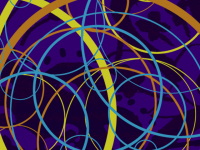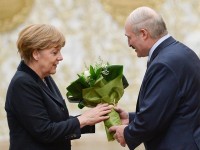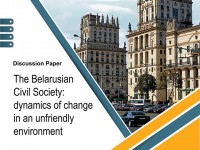Centre for European Transformation has conducted the third comprehensive study in form of monitoring of the implementation of the UNESCO Convention on the Protection and Promotion of the Diversity of Cultural Expressions by the Republic of Belarus.
Political techniques in modern authoritarian regimes: video reports

Over the last century we have observed the active dissemination of new authoritarian regimes that force out democratic ones.
Modern authoritarianism can no longer be perceived as an archaic form of a political system. It demonstrated viability, sustainability, and expansion potential. It is largely related to the formation of new technological forms of control over various spheres, as well as to the use of a wide range of modern technical resources that enable the production of large-scale media pictures of an alternative reality, provide for the formation and direction of the public opinion, influence on forming an identity, and so on. This new political techniques reality requires special treatment, both from the practical and from the research points of view. The project “Political techniques in modern authoritarian regimes” seeks to give a meaning and analyze various aspects of technological support, society’s and people’s features that enable large-scale propaganda and manipulations of public opinion. Apart from that, it also seeks to find ways to confront the unfolding consciential war.
Uladzimir Matskevich’s video reports “Political techniques of the third generation” — Part One
The first report of the Belarusan philosopher and methodologist is dedicated to the introduction of the concept of “political techniques of the third generation”.
Uladzimir Matskevich analyzes one of the most striking cases of their application in the situation of 2006 presidential elections in Belarus.
Political techniques of the third generation is a set of methods and techniques of working with mass consciousness and protest activity, used in the former Soviet countries, primarily in Belarus and in Russia. The purpose of these techniques is to ensure controllability of socio-political processes, while maintaining appearance of democracy and free will of citizens.
Application of political techniques of the third generation is fundamentally different from the way totalitarian power in the Soviet Union organized the electoral process. Then, the regime controlled all aspects of the political process; elections were uncontested and therefore the result of elections was guaranteed up to a tenth of a percent. In modern Belarus and Russia, political opposition is present in the elections, as well as independent media, being weak, though, and there are alternative candidates. None the less, the process is organized with absolute guarantee of the result planned by the current power.
Belarusan philosopher and methodologist Uladzimir Matskevich begins his series of reports on modern authoritative techniques with the analysis of one of the most striking cases, which refers to the recent political history of Belarus. This is the 2006 elections, after which the Belarusan authorities gained almost complete control over the situation in the country. The role of Alexander Kozulin is examined in the report. This politician had been a bright star on the political horizon of Belarus, and his political career was completely finished after three years. Active member of the Lukashenka team for many years, Kozulin had dramatically gone into opposition to make a quick career there, just a year before the 2006 presidential elections. Being the most expressive and radical opposition leader, he did not take part in reaching agreement on the unification of all democratic forces before the elections, he sabotaged electing a “united candidate” from the opposition.
It is interesting to watch the fate of these two candidates after the end of the elections and the dispersal of the protests that followed. Aleksander Kozulin received a prison term for taking part in unauthorized protests, he spent more than two years in prison, was then recognized as a political prisoner. His authority remained at a high level all the time within a protest part of the electorate. However, after the pardon and the release from prison Alexander Kozulin quietly left the political scene, without using or transfering the gained political capital to anyone. Alexander Milinkevich also had fairly broad support in the circles of the Belarusan opposition; however, almost immediately after the elections, a paid PR campaign against him was launched, known under the name of “Bleach M”. It caused a great damage to his image. As a result, after the 2006 elections that potentially carried a great opportunity to consolidate the protest electorate, the Belarusan opposition remained without a leader, and the idea of a “united candidate” was compromised, as well as the idea of post-election protest.
Objectively, Kozulin’s role in the 2006 elections was that he pulled over a part of the protest electorate, and did not allow to consolidate all the forces around Alexander Milinkevich. He has done his job, shattered and weakened the opposition and caused fatal disappointment in the possibility of the Belarusan “Maidan”. Was Kozulin a puppet of the Belarusan regime, or did he deliberately play his part? The question in this case is not a matter of principle. What is important is that this example clearly shows how the third generation political techniques work. The methods and effects of these techniques will be considered in future reports of the series “Political techniques of the third generation, the war on consciousness, and the European security system”.
See also: Uladzimir Matskevich: Political techniques of the third generation
[Please don't forget to turn the captions on for English subtitles!]
You can watch the full video report in Russian here.
Uladzimir Matskevich’s video reports “Political techniques of the third generation” — Part Two
The second report of the philosopher and methodologist Uladzimir Matskevich is dedicated to the process of the political techniques’ emergence and “generations” change in the post-Soviet space.
While solving the task set in the first report as of schematization of different types of political techniques, Uladzimir Matskevich sequentially examines the socio-cultural conditions and the history of emergence of political techniques in independent states, formed after the Soviet Union collapse. He is focused on the three post-Soviet countries - Belarus, Russia, and Ukraine. Transition from the politics to the management and the destruction of the principle of political competition in favour of the achievement of a guaranteed result is the main task of the political techniques of the third generation, which has been successfully achieved in the test mode during the first presidential elections in Belarus in 1994, and then in Russia. What is the fundamental difference between the political techniques of the third generation from the primitive totalitarian methods of control, what were the “good intentions” that had paved the way for the destruction of the political space as such, how did Belarus become a pilot site for Moscow political technicians - all of this can be found in the second report of the series “Political techniques of the third generation, the war on consciousness, and the European security system”.
[Please don't forget to turn the captions on for English subtitles!]
You can watch the full video report in Russian here.
Uladzimir Matskevich’s video reports “Political techniques of the third generation” — Part Three
In his third report the philosopher and methodologist Uladzimir Matskevich analyses the methods and techniques by which political technicians of the third generation manage protest electorate and public consciousness.
While first reports of the series examined the history of the emergence and change of political techniques of different generations as well as specific cases from the recent political past of post-Soviet countries, in the third report Uladzimir Matskevich turns to the main objectives, methods, and approaches thanks to which the political techniques of the third generationcan effectively manage the social processes.
As these political techniques arise in a situation where the direct destruction of opponents and use of totalitarian methods of suppressing political alternative is no longer possible, they require special approaches and methods. To achieve complete control of the situation, while maintaining the illusion of freedom of actions of the discontented and dissidents, to imitate the political process, having eliminated any possibility of competition, to minimize direct repressions, having ousted opponents into a cozy “ghetto” and having “erased” them from the screen of public consciousness, these are the main tasks to be solved by political technicians in Belarus and Russia. Double agents, adverse publicity, and thorough management of “personal conduct cases” of all potential figures in the game are only the most primitive elements, the “tip of the iceberg” of the complex of technological approaches by which to solve these problems.
In addition to the control of limits of the allowed freedom of protest electorate, the efficiency of political techniques of the third generation requires the achievement of a certain state of public consciousness. “Only when the public consciousness is ready to perceive that any fact could turn out to be fake, any lie can carry a part of the truth, when society is deprived of the opportunity to be critical of what is displayed and presented on the screen, then the power of political technicians is almost absolute,” says Uladzimir Matskevich in the third report of a series “Political techniques of the third generation, the war on consciousness, and the European security system”.
[Please don't forget to turn the captions on for English subtitles!]
You can watch the full video report in Russian here.
Uladzimir Matskevich’s video reports “Political techniques of the third generation” — Part Four
What hide the political techniques of the third generation, and why do they inevitably tend to invade the sphere of consciousness, and the neighboring countries, reasons the philosopher and the methodologist Uladzimir Matskevich.
Having indicated in the previous report the basic approaches, by which the political techniques of the third generation manage the protest electorate, Uladzimir Matskevich returns to the comparison of different generations of political techniques, but from a different point of view — from a perspective of the secret that these political techniques are designed to hide.
No need to be under a delusion while thinking that the normal political process, even in the most democratic countries, is fully open and transparent. The need to conceal a part of the information from political rivals and voters occurs with the emergence of political techniques as such. The political techniques of the first generation conceal plans of campaigns, tactics and strategies by which politicians gain trust and sympathy of the electorate. But, beginning with political techniques of the second generation this secret acquires a criminal tinge, and with political techniques of the third generation it turns into secreting a criminal conspiracy. The conspiracy aimed at distortion of the essence of the basic principles of public administration and public policy. The conspiracy destructing the media as an institution of freedom of speech. The conspiracy providing unity of capital, power, and information in the hands of a single entity free to provide with decisive advantage any candidate in the elections at all levels, leaving no chance to independent competitors. And the perfection of political techniques of the third generation is just that no one realizes that the entire management of the situation is operated from a single center.
The paradox is that everyone knows, for example, that there is no election in Belarus. However, the vast majority of the people behaves as if they did not know that. Let’s left behind the majority, a significant part of the intelligentsia, independent media and activists of political parties and civil society organizations also behave this way, that is, all those people who are called “opposition” in Belarus, as if they did not know what everybody knows!
This paradox can be explained in different ways, with the involvement of psychological interpretations, political science’ constructions, categories such as “mentality” — that is, it can be explained for the sake of explanation, without any practical perspective. Uladzimir Matskevich suggests starting with categories that make it possible not only to come to an adequate understanding of what is happening, but also to effectively work with the changes — the categories of “objectivity” and “reality” that are the essence of the war on consciousness generated by political technicians of the third generation.
[Please don't forget to turn the captions on for English subtitles!]
You can watch the full video report in Russian here.
Uladzimir Matskevich’s video reports “Political techniques of the third generation” — Part Five
Political techniques of the third generation are a threat to the European space and should be equated with weapons of mass destruction, asserts Uladzimir Matskevich in the final report.
The peculiarity of the situation of use of political techniques of the third generation, which allow simulating the political process, managing and manipulating protest electorate and the public consciousness is that until they do not go beyond the boundaries of a country they are “generated by”, no external forces have right to intervene in this situation. However banal the statement “Every nation gets the government it deserves” is, we have to reckon with it. But political techniques of the third generation have yet another feature - they inevitably tend to expand. The first reason is simple - reducing costs. Since the infrastructure aimed at providing the implementation of political techniques of the third generation is not a cheap pleasure, so political technicians are constantly striving to improve efficiency in the most banal, economic sense - reducing costs while achieving a guaranteed result. But there is another factor: aggressive character of the infrastructure development. Having reached the efficiency in implementing the tasks set, created infrastructures require setting new tasks, and this automatically leads to the widening of scope and area of application of political techniques of the third generation.
The war on consciosness launched by Russia is a clear confirmation to the statement from the above. And not only states that Russia openly refers to as being “its” territories, as the “Russian World” territories, are exposed to danger - Ukraine, Belarus and other post-Soviet republics, but the entire Western world. Why? Well, because the political techniques of the third generation parasitize on the characteristics of public consciousness and on the form of identity, which is generated primarily by the European values and attitudes. Rather, by their rebirth. The striving for objectivity and completeness of perception of the world is reduced to the formula of modern media “one fact and two comments”, the fight against totalitarianism in practice and in thinking leads to complete moral and ethical relativism, the desire for freedom of choice is transformed into infantilism and irresponsibility. And “citizens” of the Age of Enlightenment’ sample concede the historical arena to “fans” and “commentators” who live emotions, empathy, but are capable neither of taking up a position, nor of working on the restoration of the definition of objectivity and reality.
That is why the political techniques of the third generation should be interdicted as weapons of mass destruction, while the European security system should be revised. But no less important and challenging task is studying and analyzing as these techniques themselves, so the ground, the prerequisites that enable them to be effective - and this requires a shift of the paradigm of the humanities and humanities research, asserts the Belarusan philosopher and methodologist Uladzimir Matskevich.
[Please don't forget to turn the captions on for English subtitles!]
You can watch the full video report in Russian here.
Gintautas Mažeikis’s video report: “Political sphere and arena ratio in light of information wars and propaganda”
In his report, philosopher Gintautas Mažeikis discusses several concepts that have been a part of the European social and philosophical thought for quite a time.
Having started with simple concepts of a “political sphere” as a “sphere of tension of public interests” and “political arena” as a main scene, manifestation, and collisions of these interests, professor Mažeikis briefly mentioned the historical process of “sovereignties’ erosion”. This process is related not only to the delegation of some state’s authorities to super-state institutions, but also with the “penetrability” of political spheres caused by the appearance of transnational corporations and development of communication technologies. Thus, now the boundaries of a political sphere and the boundaries of the state almost never coincide, which makes us change the evaluation system and appraise the “size” of the country differently — not by the number of people and territory.
A political sphere depends on many variables, among which are conflicts and actions at the “arenas”. But since the boundaries of the political field ceased to coincide with the boundaries of the countries, it is quite logical that the “arenas”, communicative practices, and propaganda techniques might also be brought out of these boundaries. All that is a serious challenge not only to the state, but also to the international legal mechanisms.
A parallel and no less important process is the appearance and quick spreading of such phenomenon of public life as “scene” — a certain state of society, a different mechanism of social and political reality generation. Informational reality of the modern society suggests that “scenes” have gradually forced out “arenas”; from now on representations shouldn’t somehow correlate outside the virtual space and well-designed “scenes”. The whole class of political techniques became possible and efficient at the expense of society’s spectaclization.
Having launched the process of constant virtual delivery of “gore fest” in the modern society, the spectacle directors got caught in their own trap. The consumer society has its own inertia; it doesn’t consume everything it can. It has its own consumption skills; so it’s quite hard to shape the demand for this or that type of product. Besides, the habit to consume certain images lessens the audience’s ability to imagination; it stops understanding other phenomena but for those that it got used to. Thus, puppeteers start depending on the “society of the spectacle” market.
Not only the “society of the spectacle” gradually becomes capable of “self-reproduction” and “self-spectaclization”; consumption makes people euphoric, while modern technologies that are available for consumers allow them to reproduce the “spectacle” independently, regardless of huge corporations and regardless of political consultants, who strive to rule the world through the organization of different “scenes”. And the only way-out for the new “Messiahs”, who are trying “to awake the society from sleep”, is to return the arena, a real, not virtual action. However, when society is driven to such a state, arenas return in a very brutal way. Civilization skills and abilities to stimulate the society are lost; real blood and terror are used instead.
“And the problem lies not only in restoring the arenas and keeping a balance between manifestations and representations, between a political action and a spectacle, but also in making this return more or less civilized”, — claims philosopher and professor of Vytautas Magnus University (Kaunas) Gintautas Mažeikis in the end of his report.
[Please don't forget to turn the captions on for English subtitles!]
You can watch the full video report in Russian here.
Others
-
Civil society in Belarus 2015-2021: from stable development to new challenges
We present a collection of articles “Civil society in Belarus 2015-2021: from stable development to new challenges”.
-
Andrei Yahorau — Al Jazeera: “Lukashenko is irresponsible”
He said Belarus would likely face economic tightening not only as a result of the coronavirus pandemic but also a Russian trade oil crisis that worsened this past winter.
-
Shhh! Belarus Wants You to Think It’s Turning Over a New Leaf
Minsk’s muddled media clampdown could jeopardize warming of relations with the West.
-
The Belarusian Civil Society: dynamics of change in an unfriendly environment
We present a Discussion paper of dynamics of changes in the Belarusian civil society in 2015-2017.








Comments
Andrei Yahorau — Al Jazeera: “Lukashenko is irresponsible”
He said Belarus would likely face economic tightening not only as a result of the coronavirus pandemic but also a Russian trade oil crisis that worsened this past winter.